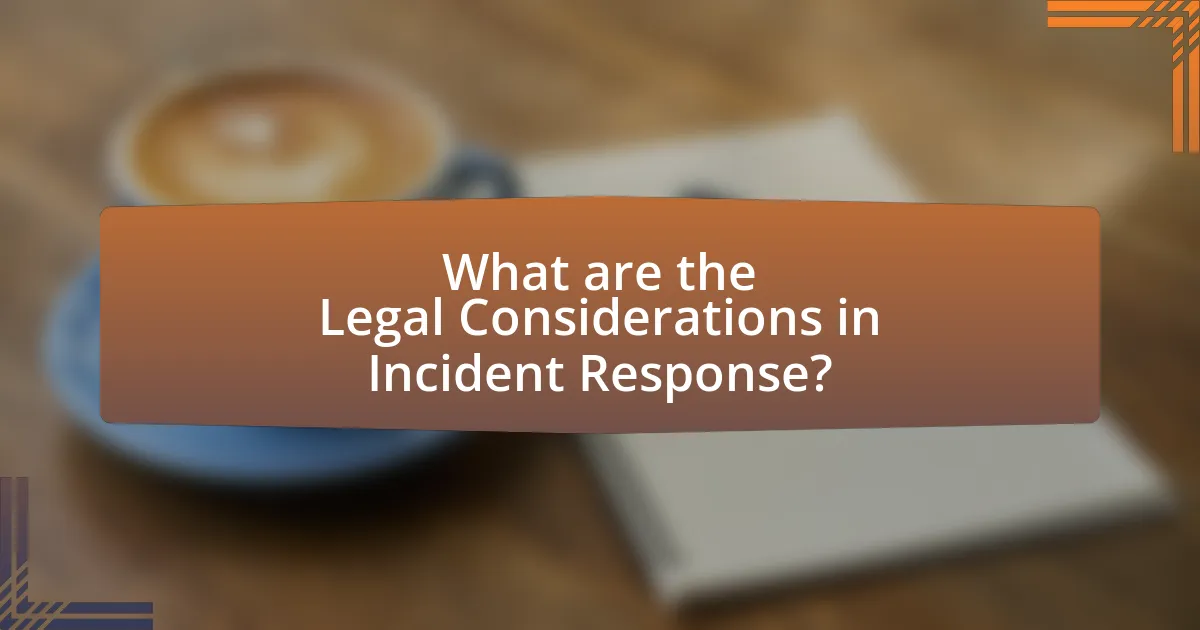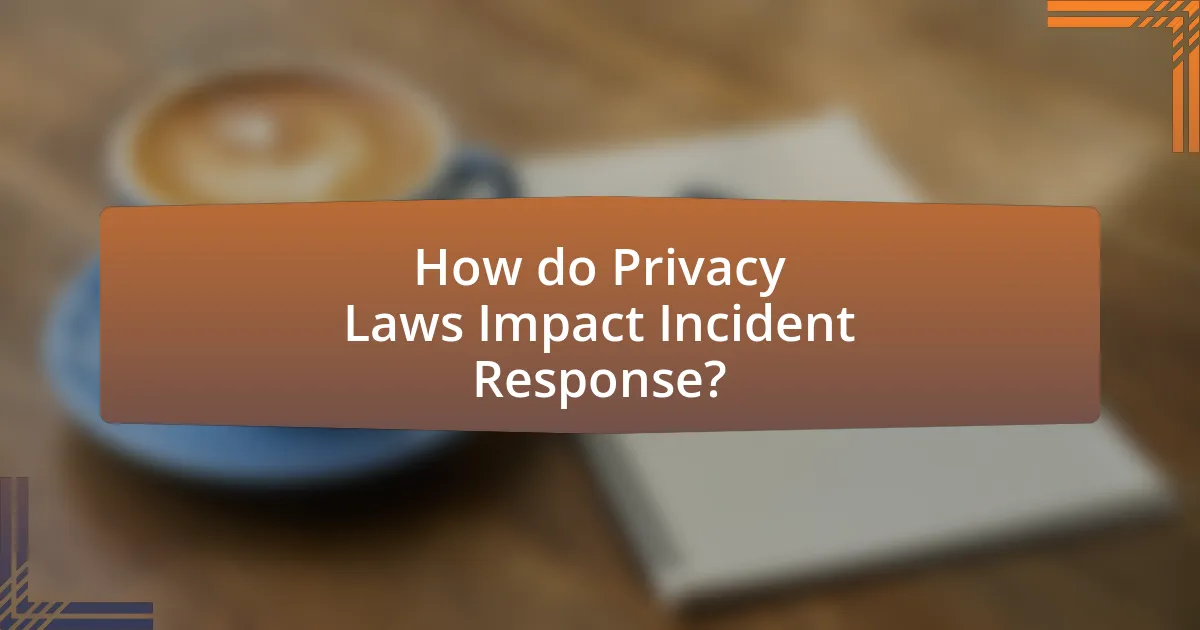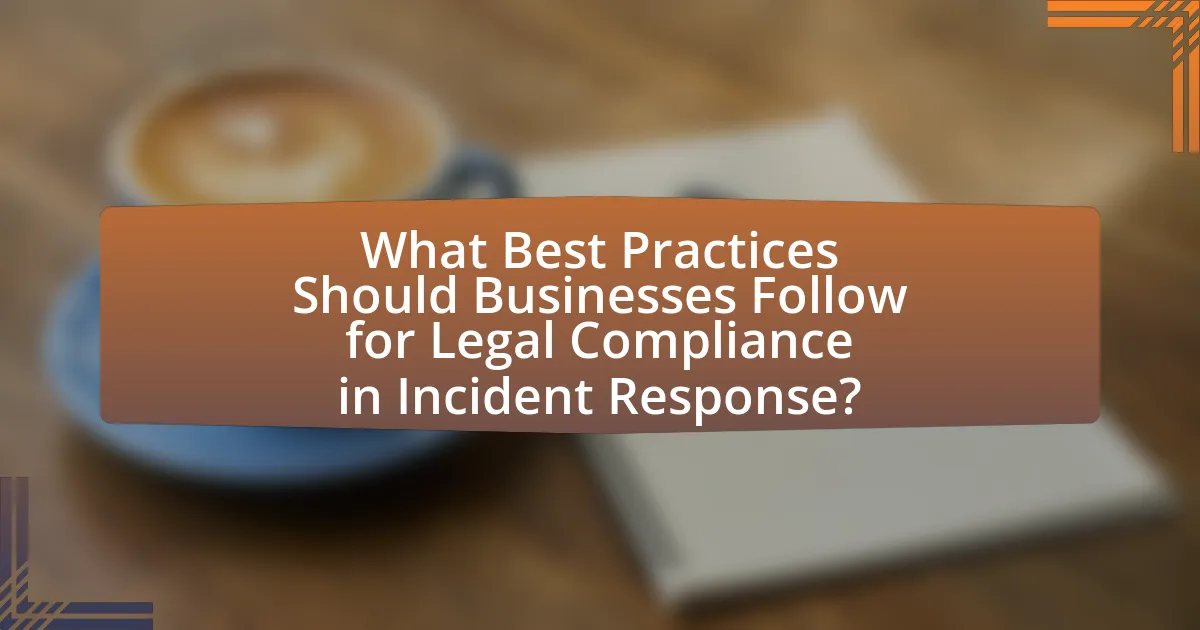The article focuses on the legal considerations that businesses must navigate during incident response, emphasizing compliance with data protection laws such as the General Data Protection Regulation (GDPR) and the Health Insurance Portability and Accountability Act (HIPAA). It outlines the importance of timely notification requirements, evidence preservation, and the potential legal risks associated with mishandling incidents. Additionally, the article discusses how varying legal frameworks across jurisdictions impact incident response practices and highlights best practices for ensuring legal compliance, including the development of structured incident response plans and effective communication with legal counsel. Overall, it serves as a comprehensive guide for organizations to manage incidents while minimizing legal liabilities.

What are the Legal Considerations in Incident Response?
Legal considerations in incident response include compliance with data protection laws, notification requirements, and the preservation of evidence. Organizations must adhere to regulations such as the General Data Protection Regulation (GDPR) and the Health Insurance Portability and Accountability Act (HIPAA), which mandate specific actions in the event of a data breach. For instance, GDPR requires that affected individuals be notified within 72 hours of a breach, emphasizing the importance of timely communication. Additionally, businesses must ensure that they preserve evidence for potential legal proceedings, as failure to do so can result in legal penalties or loss of defense in litigation. These legal frameworks guide organizations in effectively managing incidents while minimizing legal risks.
Why is understanding legal considerations crucial for businesses during incident response?
Understanding legal considerations is crucial for businesses during incident response because it helps ensure compliance with laws and regulations, thereby mitigating legal risks. Businesses must navigate various legal frameworks, such as data protection laws like the General Data Protection Regulation (GDPR) and industry-specific regulations, which dictate how to handle data breaches and incidents. Failure to comply can result in significant penalties; for instance, GDPR violations can lead to fines up to 4% of annual global turnover. Additionally, understanding legal implications aids in preserving evidence for potential litigation and maintaining trust with stakeholders, as transparency in incident handling is often legally mandated.
What legal frameworks govern incident response practices?
Legal frameworks that govern incident response practices include the General Data Protection Regulation (GDPR), the Health Insurance Portability and Accountability Act (HIPAA), and the Federal Information Security Management Act (FISMA). GDPR mandates data breach notification within 72 hours, impacting organizations handling EU citizens’ data. HIPAA requires healthcare entities to report breaches affecting protected health information, emphasizing patient privacy. FISMA establishes a framework for securing federal information systems, necessitating incident response plans for federal agencies. These regulations collectively shape how organizations must prepare for and respond to incidents, ensuring compliance and protection of sensitive information.
How do these legal frameworks vary by jurisdiction?
Legal frameworks vary by jurisdiction primarily in terms of data protection laws, breach notification requirements, and liability standards. For instance, the General Data Protection Regulation (GDPR) in the European Union imposes strict data handling and breach notification obligations, while the United States has a patchwork of state laws, such as the California Consumer Privacy Act (CCPA), which differ significantly in their requirements. Additionally, jurisdictions like Canada have their own frameworks, such as the Personal Information Protection and Electronic Documents Act (PIPEDA), which also establish unique compliance standards. These differences can affect how businesses respond to incidents, as they must navigate the specific legal obligations applicable in each jurisdiction where they operate.
What are the potential legal risks associated with incident response?
The potential legal risks associated with incident response include liability for data breaches, non-compliance with regulatory requirements, and exposure to litigation. Organizations may face legal consequences if they fail to adequately protect sensitive data, as seen in cases like the Equifax breach, where the company was held liable for not securing personal information, resulting in a settlement of $700 million. Additionally, failure to comply with regulations such as GDPR or HIPAA can lead to significant fines and penalties, emphasizing the importance of adhering to legal standards during incident response. Furthermore, organizations may encounter lawsuits from affected parties, which can arise from perceived negligence in handling incidents, underscoring the need for a well-defined incident response plan that addresses these legal risks.
What liabilities can businesses face if they mishandle an incident?
Businesses can face several liabilities if they mishandle an incident, including legal penalties, financial losses, and reputational damage. Legal penalties may arise from non-compliance with regulations such as the General Data Protection Regulation (GDPR), which can impose fines up to 4% of annual global turnover. Financial losses can occur due to lawsuits from affected parties, which may result in compensation claims. Additionally, mishandling an incident can lead to significant reputational damage, causing a loss of customer trust and potential declines in revenue. These liabilities underscore the importance of effective incident response strategies to mitigate risks.
How can businesses mitigate legal risks during incident response?
Businesses can mitigate legal risks during incident response by implementing a comprehensive incident response plan that includes legal compliance measures. This plan should outline procedures for data breach notification, evidence preservation, and communication strategies to ensure adherence to relevant laws and regulations, such as the General Data Protection Regulation (GDPR) and the Health Insurance Portability and Accountability Act (HIPAA).
Additionally, training employees on legal obligations and best practices during incidents can further reduce risks. For instance, a study by the Ponemon Institute found that organizations with incident response training experienced 50% lower costs related to data breaches. Regularly consulting with legal counsel during the development and execution of incident response strategies also helps ensure that businesses remain compliant with evolving legal standards.

How do Privacy Laws Impact Incident Response?
Privacy laws significantly impact incident response by imposing strict requirements on how organizations must handle personal data breaches. These laws, such as the General Data Protection Regulation (GDPR) in Europe and the California Consumer Privacy Act (CCPA) in the United States, mandate that organizations notify affected individuals and regulatory authorities within specific timeframes after a data breach occurs. For instance, GDPR requires notification within 72 hours, which accelerates the incident response process and necessitates that organizations have robust procedures in place to assess and respond to breaches quickly. Failure to comply with these laws can result in substantial fines, with GDPR penalties reaching up to 4% of annual global turnover or €20 million, whichever is higher. Therefore, privacy laws not only dictate the legal obligations during an incident but also influence the overall strategy and preparedness of an organization’s incident response plan.
What are the key privacy laws that businesses must consider?
The key privacy laws that businesses must consider include the General Data Protection Regulation (GDPR), the California Consumer Privacy Act (CCPA), and the Health Insurance Portability and Accountability Act (HIPAA). GDPR, enacted in 2018, regulates data protection and privacy in the European Union and European Economic Area, imposing strict guidelines on data handling and requiring businesses to obtain explicit consent from individuals for data processing. CCPA, effective from 2020, grants California residents rights regarding their personal information, including the right to know what data is collected and the right to opt-out of its sale. HIPAA, established in 1996, sets standards for the protection of health information in the United States, requiring healthcare providers and their business associates to safeguard patient data. These laws are critical for compliance and risk management in business operations.
How does GDPR influence incident response strategies?
GDPR significantly influences incident response strategies by mandating that organizations implement specific protocols for data breaches. Under GDPR, companies must notify relevant authorities and affected individuals within 72 hours of becoming aware of a breach, which necessitates a rapid and efficient incident response plan. This regulation compels businesses to establish clear procedures for identifying, reporting, and mitigating data breaches, ensuring compliance with legal obligations and minimizing potential fines, which can reach up to 4% of annual global turnover or €20 million, whichever is higher. Consequently, organizations must prioritize data protection and invest in training and resources to enhance their incident response capabilities, aligning with GDPR’s stringent requirements.
What are the implications of CCPA for incident response?
The California Consumer Privacy Act (CCPA) significantly impacts incident response by mandating that businesses implement specific protocols for data breaches involving personal information. Under CCPA, organizations must notify affected consumers within 72 hours of discovering a breach, which necessitates a rapid and efficient incident response plan. Additionally, businesses are required to maintain records of incidents and responses, ensuring compliance with CCPA’s accountability standards. This legal framework emphasizes the importance of transparency and consumer rights, compelling organizations to prioritize data protection measures and enhance their incident response strategies to mitigate potential legal repercussions.
How should businesses handle personal data during an incident?
Businesses should immediately secure personal data during an incident by implementing containment measures to prevent further unauthorized access. This includes isolating affected systems, conducting a thorough assessment of the breach, and notifying relevant stakeholders, including affected individuals and regulatory bodies, as required by laws such as the General Data Protection Regulation (GDPR). According to GDPR, organizations must report data breaches to authorities within 72 hours, emphasizing the urgency of prompt action. Additionally, businesses should document the incident, including the nature of the data involved and the response actions taken, to ensure compliance and facilitate future improvements in data protection strategies.
What steps should be taken to ensure compliance with privacy laws?
To ensure compliance with privacy laws, businesses must implement a comprehensive data protection strategy. This includes conducting regular audits to assess data handling practices, ensuring transparency in data collection and processing, and obtaining explicit consent from individuals before collecting their personal information. Additionally, organizations should establish clear data retention policies, provide employee training on privacy regulations, and implement robust security measures to protect personal data from breaches. Compliance can be validated through adherence to established frameworks such as the General Data Protection Regulation (GDPR) in Europe, which mandates specific rights for individuals and imposes strict penalties for non-compliance.
How can businesses balance data protection and incident response needs?
Businesses can balance data protection and incident response needs by implementing a comprehensive risk management framework that integrates both functions. This approach ensures that data protection measures, such as encryption and access controls, are aligned with incident response protocols, enabling swift action during a data breach while maintaining compliance with legal requirements. For instance, the General Data Protection Regulation (GDPR) mandates that organizations report data breaches within 72 hours, highlighting the necessity for a responsive incident management system that does not compromise data security. By conducting regular training and simulations, businesses can prepare their teams to respond effectively to incidents while adhering to data protection standards, thus achieving a harmonious balance between the two critical areas.

What Best Practices Should Businesses Follow for Legal Compliance in Incident Response?
Businesses should implement a structured incident response plan that aligns with legal compliance requirements. This includes establishing clear policies for data breach notification, ensuring adherence to relevant regulations such as the General Data Protection Regulation (GDPR) and the Health Insurance Portability and Accountability Act (HIPAA), and maintaining documentation of all incident response activities. For instance, GDPR mandates that organizations report data breaches to authorities within 72 hours, emphasizing the need for timely communication and record-keeping. Additionally, conducting regular training for employees on legal obligations and incident response procedures is crucial, as it prepares staff to act in compliance with laws during an incident.
What are the essential components of a legally compliant incident response plan?
A legally compliant incident response plan must include the following essential components: a clear definition of roles and responsibilities, a communication strategy, legal and regulatory compliance guidelines, incident detection and analysis procedures, containment and eradication strategies, recovery processes, and documentation protocols. Each component ensures that organizations can effectively respond to incidents while adhering to legal obligations. For instance, defining roles and responsibilities helps in accountability and efficient response, while compliance guidelines ensure adherence to laws such as GDPR or HIPAA, which mandate specific data protection measures. Additionally, documentation protocols are crucial for legal evidence and regulatory reporting, reinforcing the plan’s compliance and effectiveness.
How can businesses ensure their incident response team is legally informed?
Businesses can ensure their incident response team is legally informed by providing regular training on relevant laws and regulations, such as data protection and cybersecurity laws. This training should include updates on changes in legislation, case law, and best practices to maintain compliance. For instance, the General Data Protection Regulation (GDPR) mandates that organizations must understand their legal obligations regarding data breaches, which emphasizes the need for continuous education. Additionally, businesses can consult with legal experts to review incident response plans and ensure they align with legal requirements, thereby minimizing liability and enhancing the team’s effectiveness in managing incidents.
What role does documentation play in legal compliance during incident response?
Documentation is crucial for legal compliance during incident response as it provides a detailed record of actions taken, decisions made, and communications conducted throughout the incident. This record is essential for demonstrating adherence to regulatory requirements, such as those outlined in the General Data Protection Regulation (GDPR) and the Health Insurance Portability and Accountability Act (HIPAA), which mandate that organizations maintain accurate records of data breaches and responses. Furthermore, thorough documentation can serve as evidence in legal proceedings, helping to establish that an organization acted responsibly and in accordance with applicable laws. By maintaining comprehensive logs and reports, organizations can effectively mitigate legal risks and enhance their accountability during incident response efforts.
How can businesses prepare for potential legal challenges post-incident?
Businesses can prepare for potential legal challenges post-incident by implementing a comprehensive incident response plan that includes legal consultation. This plan should outline procedures for documenting the incident, preserving evidence, and communicating with stakeholders. Legal experts can guide businesses on compliance with relevant laws and regulations, ensuring that all actions taken during the incident response are legally sound. For instance, the General Data Protection Regulation (GDPR) mandates specific reporting timelines and procedures for data breaches, which businesses must adhere to in order to avoid penalties. Additionally, conducting regular training and simulations can help staff understand their roles in legal compliance during an incident, thereby reducing the risk of legal repercussions.
What strategies can be employed to effectively communicate with legal counsel during an incident?
To effectively communicate with legal counsel during an incident, businesses should establish clear communication protocols, ensure timely information sharing, and maintain documentation of all interactions. Clear communication protocols involve defining roles and responsibilities, which helps streamline the flow of information. Timely information sharing is crucial; legal counsel must receive updates as incidents unfold to provide relevant advice. Maintaining documentation of all communications ensures that there is a record of decisions made and advice given, which can be critical for legal compliance and future reference. These strategies enhance collaboration and ensure that legal counsel can provide informed guidance during incidents.
What are the best practices for reporting incidents to authorities?
The best practices for reporting incidents to authorities include promptly notifying the relevant law enforcement or regulatory agencies, providing clear and accurate information about the incident, and maintaining documentation of all communications. Prompt notification is crucial as it allows authorities to respond quickly and effectively, which can mitigate further damage. Clear and accurate information, such as the nature of the incident, time, location, and any involved parties, ensures that authorities can assess the situation appropriately. Maintaining documentation of all communications serves as a record that can be referenced later, which is essential for legal and compliance purposes. These practices align with guidelines from organizations like the Federal Bureau of Investigation, which emphasizes the importance of timely and detailed reporting in incident response.
What practical steps can businesses take to enhance their legal preparedness in incident response?
Businesses can enhance their legal preparedness in incident response by developing a comprehensive incident response plan that includes legal considerations. This plan should outline roles and responsibilities, establish communication protocols, and ensure compliance with relevant laws and regulations, such as data protection and breach notification laws.
Additionally, businesses should conduct regular training for employees on legal obligations during incidents, ensuring they understand the importance of documentation and reporting. Engaging legal counsel to review the incident response plan and provide guidance on legal risks associated with potential incidents is also crucial.
Furthermore, businesses should maintain an updated inventory of applicable laws and regulations, as well as establish relationships with law enforcement and regulatory bodies to facilitate timely communication during an incident. These steps collectively strengthen a business’s legal preparedness and ability to respond effectively to incidents.
